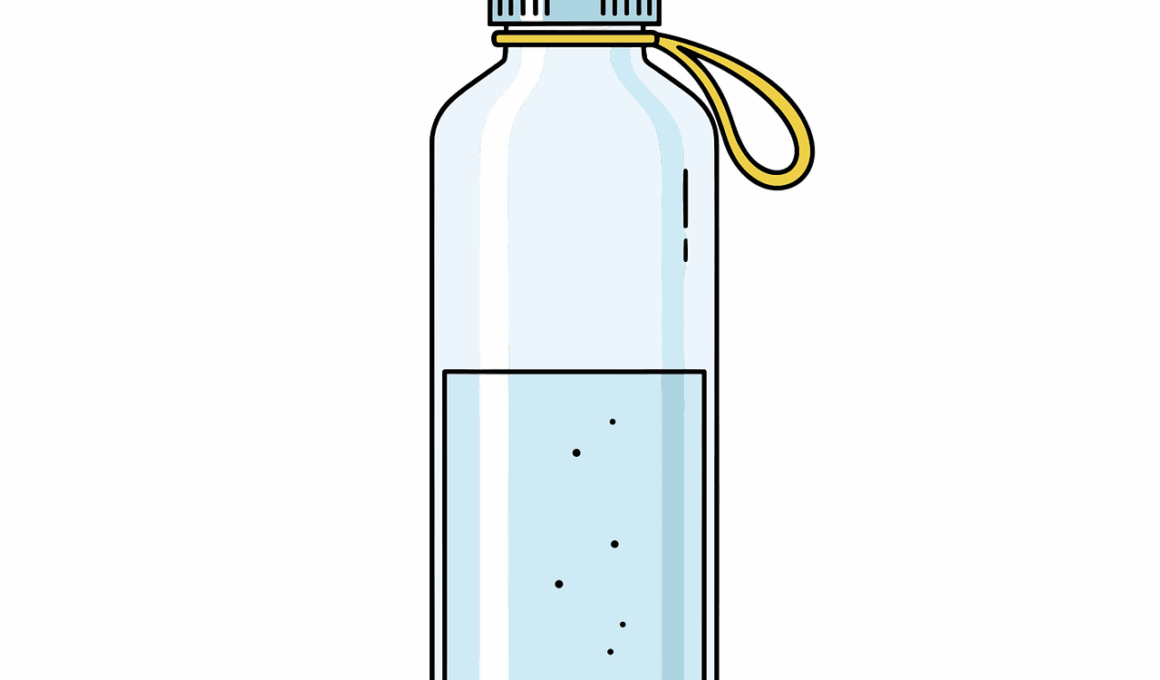Impact of Dehydration on Muscle Function and Endurance
Dehydration is a significant concern for athletes and active individuals engaged in prolonged physical activities. When the body loses more fluids than it takes in, performance can deteriorate markedly. This condition affects muscle function, leading to decreased strength and endurance. Proper hydration maintains optimal body temperature and ensures the effective transport of nutrients to muscle tissues. When dehydrated, individuals may experience cramps, fatigue, and overall decline in physical capabilities. Maintaining hydration before, during, and after exercise is pivotal. Research shows that even a small drop in body water content can lead to noticeable changes in performance, particularly in endurance sports. Athletes should monitor their fluid intake regularly and adjust according to environmental conditions and workout intensity. Additionally, pre-hydration strategies may benefit long-term performance enhancements. Water and electrolyte balance also plays a crucial role in cardiovascular function, impacting both the heart rate and the efficiency of oxygen delivery to muscles. Bioenergetics data suggests that dehydration can impair energy metabolism, influencing muscle recovery and growth following workouts. Understanding hydration’s importance is critical for athletes aiming to optimize their training and competition outcomes.
Hydration levels significantly influence endurance performance, as even mild dehydration can lead to both physical and cognitive impairments. In endurance events like marathons or triathlons, athletes run the risk of dehydration due to excessive sweating. This loss reduces blood plasma volume, compromising cardiovascular function, a crucial factor for endurance activities. A well-hydrated athlete can sustain longer exercise durations and recover more effectively post-activity. Dehydration leads to increased heart rate, decreased stroke volume, and potentially impaired thermoregulation. These physiological changes can prevent athletes from reaching their potential. Additionally, the perception of effort becomes more pronounced when dehydrated, making tasks feel more taxing than usual. Studies indicate that a dehydration-induced increase in body temperature can lead to earlier onset of fatigue, shortening the workout duration. To counter dehydration, athletes often turn to sports drinks enriched with electrolytes to replenish lost minerals and enhance hydration rates. The timing of hydration also plays a role; drinking fluids before the onset of thirst is vital to prevent dehydration during exercise. Overall, hydration strategies should be personalized, taking into account individual sweat rates, environmental conditions, and specific athletic demands to optimize performance outcomes.
Muscle function is intricately linked to hydration status, as proper fluid levels are essential for sustaining biochemical processes. Electrolyte imbalances from dehydration can result in impaired neuromuscular functions, leading to muscle cramps or spasms. These cramps often occur during unprepared high-intensity efforts when the body is already fatigued. An understanding of hydration’s impact allows athletes to take preventative measures to minimize instances of cramping during performances. Water assists in nutrient digestion, absorption, and transportation to the muscle cells, which are crucial for energy production. When the body is dehydrated, the heart increases its workload, pumping harder to circulate blood, which puts additional stress on muscles. For strength athletes, hydration status can directly affect their lifting capabilities and overall performance metrics. Many strength athletes report a perceived decline in strength during dehydration, resulting in reduced lifting efficiency. It is essential to consume adequate fluids both before and during workouts. Research indicates that a hydration strategy that includes electrolyte supplements can facilitate better muscle function and prolong performances. Hydration timing, amounts, and types of fluids should all be considered to enhance muscle function and overall exercise endurance.
Strategies for Maintaining Optimal Hydration
Maintaining optimal hydration involves understanding personal needs and reactions to fluid loss during exercise. Athletes should monitor body weight fluctuations before and after exercise sessions as a guideline for their hydration needs. Drinking sufficient fluids throughout the day is critical, as thirst is often not a reliable indicator of hydration status. Hydration strategies should be developed based on various factors including exercise intensity, heat exposure, and personal sweat rates. A typical recommendation is to consume fluids before engaging in physical activity and to replenish every 15 to 20 minutes during exercise. In hot climates or for prolonged activities, this frequency may need to increase. Including electrolyte-rich beverages can assist in replacing essential minerals lost through sweat, enhancing recovery and performance. It is beneficial to practice hydration plans during training sessions to hone in on specific needs before competition. Furthermore, analyzing urine color can provide a quick and effective assessment of hydration status—a pale yellow indicates good hydration, while dark urine prompts immediate fluid intake. Developing a personalized hydration strategy enables athletes to ensure optimal performance and minimize risks associated with dehydration during intense exercise.
The role of hydration extends beyond physical performance to psychological factors like concentration and mood, which can also decline when dehydrated. Studies have shown that fluid loss can lead to decreased cognitive performance, rendering athletes unable to focus and make quick decisions during critical moments. This lack of focus can jeopardize not only performance but also injury prevention, as lower cognitive function may lead athletes to neglect proper technique or fatigue management. Additionally, dehydration can cause irritability and frustration; these mood changes hinder an athlete’s motivation to push through challenging workouts or competitions. It is essential to incorporate hydration strategies that address both physical and mental needs during training and competition. Engaging in proper hydration practices can lead to improvements in mood state, sustained mental clarity and better reactions. Implementing visual reminders to maintain hydration, such as water bottles or infusion systems, can help establish consistent routines. The synergistic effect of physiological and psychological hydration should not be underestimated, as peak performance relies on both elements. Thus, addressing these interconnected aspects ensures comprehensive athlete readiness and resilience during challenging physical endeavors.
Finally, understanding the long-term implications of chronic dehydration emphasizes the importance of adopting proactive hydration habits. Over time, persistent dehydration can lead to long-lasting muscle dysfunction, impairing recovery potential and overall performance throughput. Chronic hydration deficits may lead to decreased muscle mass and compromised metabolic function, affecting athletes beyond immediate exercise performance. Additionally, athletes may experience a decrease in appetite or digestion issues resulting from unaddressed hydration problems. Strategies for athletes include conducting regular hydration assessments to identify trends in fluid intake and performance fluctuations. Educating oneself regarding the signs and symptoms of dehydration empowers athletes to take control of their health and performance. Athletes benefiting from health-guided hydration assessments are more likely to adopt adaptable fluid strategies conducive to their needs. Making informed hydration choices can influence both training and competition sustainability over time. Recognizing that hydration is an essential component of a holistic approach to exercise enhances athlete productivity and well-being. Thus, diligent attention to hydration not only preserves performance capabilities but also contributes to an athlete’s long-term health.
In summary, the significance of hydration in exercise performance cannot be overstated. Athletes must prioritize hydration routines as part of their training regimens to fortify muscle function and endurance. Understanding the physiological mechanisms of hydration leads to improved performance outcomes and injury prevention. Research underscoring hydration’s crucial role emphasizes that adequate fluid replenishment can facilitate optimal muscle recovery and growth. The engagement in hydration strategies should be personalized, allowing for variability based on individual responses to fluid loss. As athletes strive for peak performance, ignoring hydration needs can compromise both short-term results and long-term health. Instilling good hydration practices early on lays a foundation for sustained athletic success. The holistic approach to exercise encompasses well-rounded nutrition and hydration awareness as complementary components. Athletes who integrate mindful hydration into their overall training strategy are more likely to experience substantial gains in muscle function and exercise endurance. Emphasizing the cognitive and emotional aspects of hydration further enriches its role in performance. Ultimately, integrity in hydration practices enhances athletic excellence, allowing individuals to pursue their goals effectively, safeguarding their health along the journey toward personal bests.
Recognizing the importance of hydration as part of overall athletic excellence, athletes can unlock significant performance enhancements. Ensuring water levels are optimal before, during, and after any physical exertion protects against adverse outcomes and promotes peak performance. Dehydration poses risks that can jeopardize training regimens, performance outcomes, and crucial recovery times. By adopting a consistent replenishment strategy, athletes maintain their competitive edge and harness their true potential. Trainers and athletes alike must engage in ongoing dialogue about hydration dynamics, adapting protocols for various conditions and individual needs. Priority should be given to education around nutrient needs and the impact of hydration on muscle performance and overall exercise efficiency. With every training session, the importance of hydration must remain a focal point for success. Understanding that hydration affects not only physicality but cognitive elements during strenuous activities aids in developing comprehensive training plans. The takeaway is clear: hydration is not merely an afterthought; it is a fundamental priority within the framework of serious athletic training, ensuring athletes can perform optimally and achieve their personal goals with resilience and vitality.


